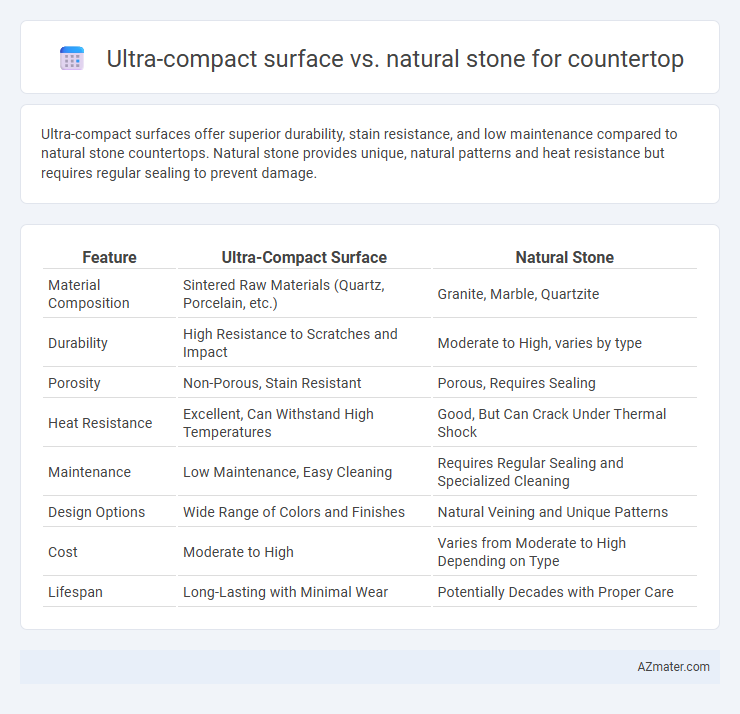Ultra-compact surfaces offer superior durability, stain resistance, and low maintenance compared to natural stone countertops. Natural stone provides unique, natural patterns and heat resistance but requires regular sealing to prevent damage.
Table of Comparison
| Feature | Ultra-Compact Surface | Natural Stone |
|---|---|---|
| Material Composition | Sintered Raw Materials (Quartz, Porcelain, etc.) | Granite, Marble, Quartzite |
| Durability | High Resistance to Scratches and Impact | Moderate to High, varies by type |
| Porosity | Non-Porous, Stain Resistant | Porous, Requires Sealing |
| Heat Resistance | Excellent, Can Withstand High Temperatures | Good, But Can Crack Under Thermal Shock |
| Maintenance | Low Maintenance, Easy Cleaning | Requires Regular Sealing and Specialized Cleaning |
| Design Options | Wide Range of Colors and Finishes | Natural Veining and Unique Patterns |
| Cost | Moderate to High | Varies from Moderate to High Depending on Type |
| Lifespan | Long-Lasting with Minimal Wear | Potentially Decades with Proper Care |
Introduction to Countertop Materials
Ultra-compact surface countertops, composed of compressed natural minerals and advanced resins, offer exceptional durability, resistance to scratches, stains, and heat, making them ideal for modern kitchens. Natural stone countertops such as granite, marble, and quartzite provide unique, organic patterns and timeless elegance but require regular sealing to maintain their beauty and prevent damage. Both materials cater to different aesthetic preferences and maintenance levels, with ultra-compact surfaces excelling in longevity and natural stone prized for its authentic, luxurious appearance.
What is Ultra-Compact Surface?
Ultra-compact surface is an engineered material made from a blend of quartz, porcelain, and glass, offering exceptional durability, stain resistance, and scratch-proof properties ideal for countertops. This innovative surface features a non-porous, low-maintenance finish that resists heat and UV rays, making it suitable for both indoor and outdoor kitchen applications. Compared to natural stone like granite or marble, ultra-compact surfaces provide greater flexibility in design, consistent color patterns, and superior performance against wear and moisture.
Natural Stone Countertops Explained
Natural stone countertops, including granite, marble, and quartzite, offer unique, durable surfaces formed over millions of years, prized for their natural veining and heat resistance. Unlike ultra-compact surfaces made of engineered materials like porcelain and quartz composites, natural stone provides an authentic, one-of-a-kind aesthetic with inherent variations that enhance kitchen design. Maintenance requires sealing to prevent staining, but the longevity and timeless appeal of natural stone make it a preferred choice for upscale countertop applications.
Aesthetic Differences: Ultra-Compact vs Natural Stone
Ultra-compact surfaces feature a sleek, uniform appearance with vibrant colors and consistent patterns, making them ideal for modern and minimalist kitchen designs. Natural stone offers distinct, unique veining and texture variations, adding character and a timeless aesthetic that cannot be replicated. The choice between ultra-compact and natural stone countertops largely depends on whether homeowners prefer engineered precision or organic beauty.
Durability and Strength Comparison
Ultra-compact surfaces offer exceptional durability and superior resistance to scratches, stains, and heat compared to natural stone countertops like granite or marble. Engineered with advanced manufacturing techniques, ultra-compact materials provide uniform strength and minimal porosity, significantly reducing the risk of cracks and chips over time. In contrast, natural stone, while strong, can be more susceptible to surface damage and requires regular sealing to maintain its resilience and prevent staining.
Maintenance and Care Requirements
Ultra-compact surfaces for countertops offer exceptional resistance to stains, scratches, and heat, requiring minimal maintenance with just regular cleaning using mild soap and water. Natural stone countertops like granite and marble demand more diligent care, including periodic sealing to prevent staining and damage from acidic substances. The durability and low upkeep of ultra-compact materials make them ideal for busy kitchens seeking long-lasting, hassle-free surfaces.
Stain, Scratch, and Heat Resistance
Ultra-compact surfaces offer superior stain resistance due to their non-porous structure, preventing liquids from seeping in, unlike many natural stones that may require sealing to avoid stains. Scratch resistance is significantly higher in ultra-compact materials, as their dense composition withstands everyday wear better than softer stones such as marble or limestone. Heat resistance favors ultra-compact countertops, which can tolerate higher temperatures without damage, whereas natural stone can crack or discolor under direct heat exposure.
Environmental Impact and Sustainability
Ultra-compact surfaces for countertops boast lower environmental impact due to their energy-efficient production processes and high durability, reducing the need for frequent replacements. Natural stone, while biodegradable and sourced from the earth, often involves intensive quarrying that leads to habitat disruption and higher carbon emissions during extraction and transport. Sustainable countertop choices prioritize materials with minimal environmental footprints and long lifespans, positioning ultra-compact surfaces as a more eco-friendly alternative compared to traditional natural stone options.
Cost Analysis: Ultra-Compact vs Natural Stone
Ultra-compact countertops typically cost between $50 and $100 per square foot, offering a competitive price compared to natural stone options such as granite and marble, which range from $60 to $150 per square foot. Installation expenses for ultra-compact materials tend to be lower due to their lighter weight and easier handling, reducing labor costs by approximately 10-20%. Long-term maintenance costs favor ultra-compact surfaces as they resist staining and require no sealing, unlike natural stone that demands periodic sealing and specialized cleaning products, increasing upkeep expenses over time.
Which Countertop is Right for You?
Ultra-compact surfaces offer exceptional durability, scratch resistance, and low porosity, making them ideal for busy kitchens and modern aesthetics. Natural stone countertops, such as granite or marble, provide unique patterns and a timeless elegance but require regular sealing and maintenance to prevent staining. Choosing the right countertop depends on your lifestyle, maintenance preferences, and design goals, balancing the ultra-compact surface's practicality with natural stone's classic beauty.

Infographic: Ultra-compact surface vs Natural stone for Countertop
 azmater.com
azmater.com